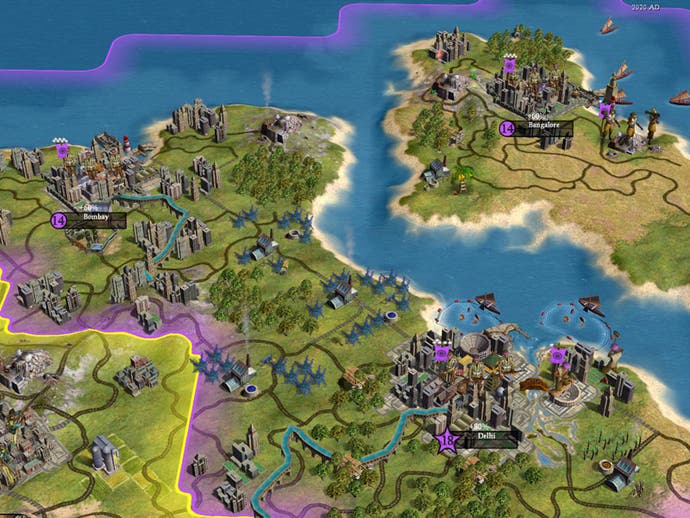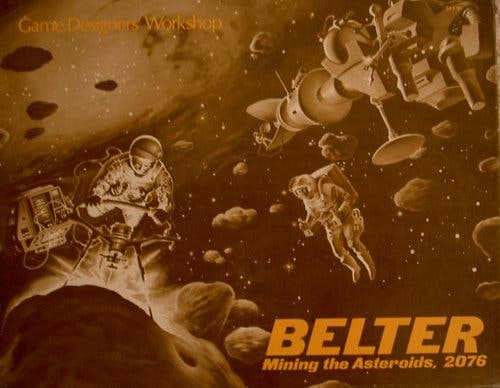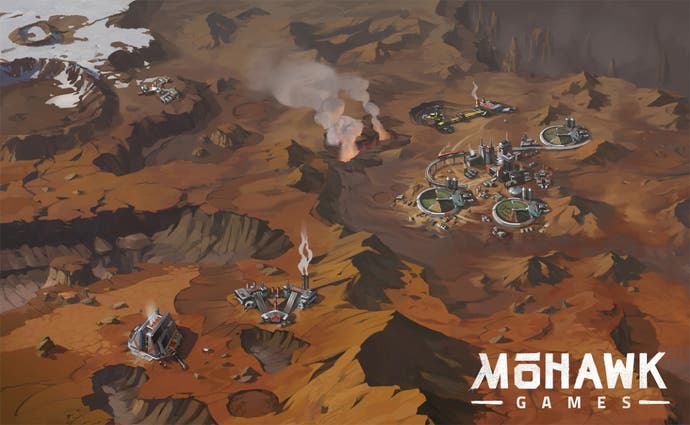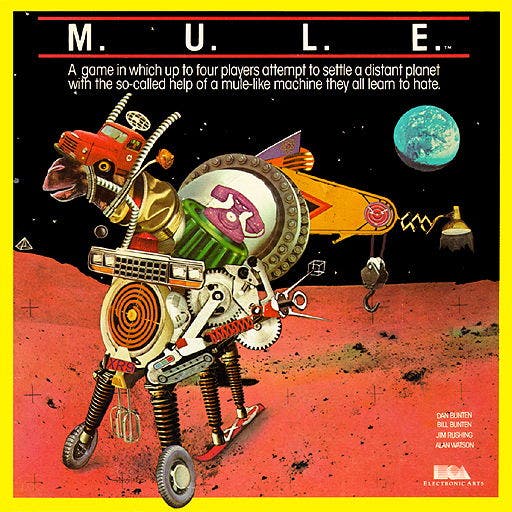Civ 4 designer swaps culture for commodities in Offworld Trading Company
A new life awaits you!
Flash Boys, by Michael Lewis, is very nearly science fiction. The book's narrative revolves around an elite who have manipulated technology to the point where they can practically see the future. They can see what you're planning to do, and then they can use those plans against you. They can read your mind. They're almost inside your head.
Sadly, though, Flash Boys isn't science fiction at all. Lewis' latest is a furious exposé of high-frequency trading, and high-frequency traders are a group of horrible jerks - as Lewis has it - who have been exploiting the fact that they were the first to spot that Wall Street had started to operate in milliseconds rather than minutes and hours and days. They laid down special fibre optic channels to travel between crucial servers in as straight a line as possible - one of these channels even went through a mountain range so as not to lose time with bends - and then, using the milliseconds of advantage this gave them over everyone else still using the standard fibre optic channels, they were able to see your buy order leaving your computer, they were able to beat that order to the market, and they were able to grab the shares you were after and then sell them to you, pocketing a profit. HFTs only buy when you want to buy. They only buy because you want to buy. They're assume no market risk, they warp in straight out of the entangled future and yet they've landed here in the present, just so they can give you a shoeing.
Flash Boys has already sold to the movies, but reading it this summer, I inevitably wanted it to be a game instead. In a movie you can see the bad men doing their bad stuff. In the game, you could be the bad men, and that seems a lot more entertaining - and a lot more enlightening. Economics and games are a natural fit anyway: games are good at simulating precisely the kinds of systems that economics thrives within. Games can simulate the kind of wildness and volatility you get as the urge to make money evolves.
Speaking of all that, an economics game would probably be a science fiction game, too, since the current stock market is straight out of J. G. Ballard and Robert Heinlein and M. John Harrison and Philip K. Dick. Happily, Soren Johnson, lead designer of Civ 4 among other things, is now making Offworld Trading Company - a science fiction game that revolves around economics.

Or does it? Speaking over Skype, Johnson offers two conflicting viewpoints on the subject within the space of a few minutes. The first is the wide-angle take, and you've probably heard it before. Deep down, this argument runs, most games are already about economics because most games are about scarcity. "I'm sure you could make the case that every game is an economic game," he says. "Especially strategy games. It's all just a limited set of resources, and you're trying to figure out which ones will give you the biggest benefits." (Just the other day, incidentally, somebody explained the short blanket theory of football to me - that there's always too much pitch and never enough team. Even football is about economics, in other words - and that's before you arrive at the transfer window and the woozy troughing of the Premier League.)
On the other hand, though, while Johnson may describe Offworld as an 'economic RTS' in the advertising, he actually suspects it's a little more specialised. This is the close-up perspective: when I ask Johnson if making a game about markets has encouraged him to explore and express his own thoughts about the real-world Wall Street, for example - particularly the events of 2008 - he prefers to narrow the target.
"I certainly have some thoughts about the economics of the past decade, which have been pretty crazy," he allows. "And I'm sure that's influenced some of the stuff we've put into Offworld. The thing I think Offworld is about is kind of not really fully about economics, though. It's about adaptation. It's important to be flexible, to have a flexible mindset, so you don't think there's always one answer for everything. It's ultimately an anti-ideological message, There's not one system or one answer or one right way of doing things. It's always important to look at your situation, to look at the environment, to look at the past, even."
Besides, a game designed to tackle what happened in the US in 2008? "That would actually be more of a legal, political type game," suggests Johnson. "Certainly, though, from playing Offworld, it does give you a better intuitive sense of the free market. There's a reason why things cost what they do, and why the market's often volatile."

In truth, the markets of Offworld actually make a lot more sense than the markets ruled by Michael Lewis' flash jockeys. They seem frankly old-fashioned at times. Buying and selling does entirely comprehensible things to supply and demand curves here and there's a certain openness - on the surface at least - to your simple objective. You know, make a pile of money as effectively as you can, and then use that money to gobble up stock in your rivals and eventually buy them out. Last player standing is the winner.
And if there's a dark heart beating within the game, it's this: pity Mars, where Offworld is set, because after the Vikings and the Rovers and the orbiting water hunters, we're going to send scientists, and then we're going to send businessmen. Sending businessmen is where Offworld kicks off in fact. In the current prototype - so early that Johnson's asked me not to take screenshots - you start each match looking down on a hex map of Mars, choosing where to position your base.
You'll want your base to be within easy reach of the game's handful of basic resources, and then, once you've picked a spot, you'll start claiming tiles that have resources you're going to want to exploit. There's a range of different classes you can play as, but the basics of what follows is essentially the same for everyone: you gather resources, use some of them in combination to produce more complex resources, build up your infrastructure, picking the right mix of factories and mills and the like, and then buy and sell on the open market, occasionally levelling up as you go. Don't forget the short blanket, though: you'll never have enough claims at any one time to stake out all of the land and resources you want. Also, whenever you interact with the market, you change that market. Buy resources you need to expand or to build factories and the prices will go up. Dump resources you've got too many of, and those resources will tank.
It's an RTS like no other, and not just because the hex layout will initially trick you into a turn-based mindset. There are no units to control in this world, for starters. "You know, originally we thought we'd have units like you do in other RTS games," says Johnson. "But eventually we realised that since the real focus of the game is economics, it's really beneficial to let the player stand back and not have to deal with micromanagement. The game now takes care of all that stuff itself."

This is a classic case of how a simple assumption can fundamentally warp a design. "Early on, just arranging blimp routes back and forth between different buildings, moving the engineers and doing all the scouting yourself, it almost had a feeling more like Railroad Tycoon, where you're like building this transportation network," says Johnson. "Railroad Tycoon is about a network of nodes on a map. That is essentially what that game is. There is sort of a markets thing, but it's in the background. With Offworld, we're really a game that's purely about that market, and everything else flows from there."
On that subject, one of the hardest things to adjust to with Offworld is the markets panel itself, which takes up a good chunk of the screen. Initially, it feels like playing StarCraft, say, with an upgrade menu open the whole time.
"When people start playing they're used to thinking that they should be focusing on the map," agrees Johnson. "If only because that's where most RTS games are. But then they realise that the game is really in that market. You're really playing this UI element and benefiting from what you see happening. Once people make that connection, that's really when they understand what the game's about."
Perversely, it's precisely when you start to understand how different Offworld is that it starts to seem more familiar. It certainly moves at a familiar pace. Playing against a handful of AI corporations, it's as brisk and bloodthirsty as any Blizzard game, and the intricacies that the market allows for create some classic build-tree brinkmanship.
"It's interesting to see the things that come out naturally from the system," Johnson explains. "You're always making a choice based off limitations. So when you start Offworld, you get four claims. The conservative strategy is: alright, I know I need water, I know I need food, I know I need steel to upgrade, I know I need energy, and I know I need iron. Even right there, that's five things and I only have four claims, right? But these are your base resources and you're probably not going to make a lot of money off of them.
"So sometimes what you might do is you'll cheat," he laughs, "Water's a very common one to cheat on, meaning I'm going to just ignore water because I'll just assume other people are going to sell it. Water is often very cheap because usually it's a very common resource. People claim it right away, and then they get into a money crunch so they dump it. If you're playing against veterans, it's almost a given that you're not going to go for the base set of resources at the start. But if you go too far, if everyone does that and everyone decides to cheat on water, then they're all going to be in trouble. Except the person who saw it coming." This may seem clinical when described in such terms, but that's Wall Street, isn't it, where the wrong end of a mortgage-backed security or a credit-default swap can be the blandly named vehicle of your damnation. In truth, somebody just got squashed into the sidewalk.

What's really surprising about Offworld, though, isn't that its abstraction allows for such brutality, but that its brutality unfolds so swiftly. Throughout the design you see tweaks that have been made to speed things up, to hurry things towards the most satisfying of conclusions.
And the endgame is a case in point. You win in Offworld by buying up your rivals' stock, but buying this stock is a one-way process. You can't sell it.
"Originally you could both buy and sell stocks," says Johnson. "But we want Offworld to have that RTS pacing. If you can't play this game in a lunch session, something's gone wrong. Selling's ultimately going to take you farther away from victory rather than closer to it.
"But there's this other issue that's more tied to how you influence the stock market," he continues. "Let's say there are two opponents, and you're buying up stock in both of them, or even in yourself. If you allow people to sell, it's like they have this access to money that's set aside. At any moment they can open that up and use it to buy up someone else. And since that's possible, it becomes the thing that everyone has to do. If it's the safest thing to win, it's just what you have to do. It creates these awkward situations where, if you see someone sell all their stock, which theoretically makes them vulnerable, you're ultimately going to be five or 10 seconds behind them and they'll use that money to buy you out. Taking that out, we're trying to focus the player on the path that makes sense. When you're making a choice to buy something - here's the important thing - you are foregoing the value of your cash as an investment. Instead, you're using it to win the game."
It sounds complex, but the urge towards acquisition is surprisingly - worryingly - innate. Offworld can be disturbing precisely because its ruthlessness will come naturally. And ultimately, if you're looking for a true indicator of how effective Johnson's modelling of economics is - if you're seeking to solve Johnson's conundrum as to whether this truly is a game about economics in the first place - you need look no further than the bitterness of the endgame. A bitterness that has surprised even the designer.
"Some of the funnest stuff revolves around use of the sabotage weapons," concludes Johnson. "The EMPs, the dynamite, the mutinies you can spring on other players. We've had this playtest where I will mutiny somebody's geotherm energy plant, which is very valuable, and then they destroy it just because they're so annoyed. I had to actually add code to allow that. I originally had code that reflected the fact that it would never be a good move to dynamite something that's going to come back to you, right? Someone gets your geotherm, they'll be there for two minutes, but eventually you're going to get it back. The best thing is just to wait it out.
"What I've discovered, though, is that for some players, emotionally, the best thing to do is to blow it up." Johnson laughs. "People kept asking for that, and eventually I was like: fine. I'm pretty sure this is a sub-optimal decision, but if they're enjoying it, you might as well put it in there."
I reckon even the Flash Boys would understand that.
Offworld Trading Company is available for pre-order here. Purchasing grants immediate access to the prototype.









